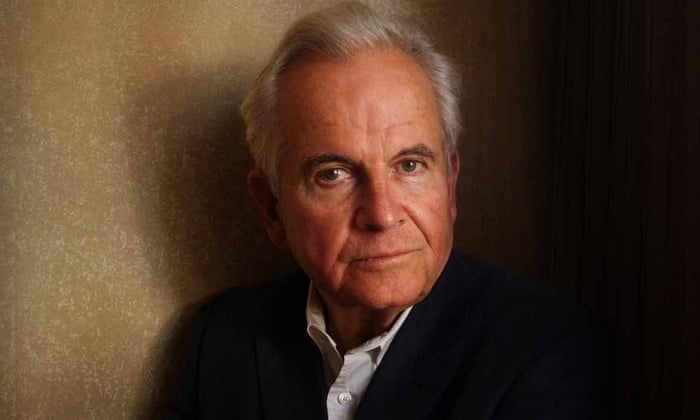 |
| Agregar leyenda |
Sir Ian Holm obituary
Acclaimed actor whose dazzling career included memorable roles in Alien, Chariots of Fire and The Lord of the Rings
Michael Billington and Ryan Gilbey
Fri 19 Jun 2020 18.37 BST
Ian Holm, who has died aged 88, was a brilliant actor in all media whose career fell into distinct phases. On stage, he enjoyed a dazzling early period and triumphant later years, most especially in Shakespeare and Pinter; but, if there was a prolonged period when Holm was absent from the theatre, it was because he suffered a temporarily paralysing form of stage fright. The theatre’s loss, however, was the cinema’s gain. He transferred the vocal precision, technical skill and impish mischief he had displayed on stage to the screen, enjoying a new, late-flowering career in scores of movies including, most notably, the Lord of the Rings cycle.
Though he had begun to make his mark at the Shakespeare Memorial theatre, Stratford-upon-Avon, in the 1950s, he came into his own when Peter Hall took over in 1960 and transformed a summer festival into the Royal Shakespeare Company. Holm instantly became a contract artist and graduated from spry character actor to leading man.
His long grounding in Shakespeare, his iron technique and his total mastery of verse bore rich fruit in the 1964 season, when Hall presented a complete Shakespeare history cycle. In the course of a single week it was possible to see Holm growing from a beady, watchful Prince Hal to a working-warrior Henry V who joined his men in pushing a wagon off-stage as they sang a post-Agincourt Te Deum. As if that were not enough, he then turned into a wickedly malevolent Duke of Gloucester and snickering, snarling Richard III in the concluding Wars of the Roses trilogy, which was filmed for BBC television.
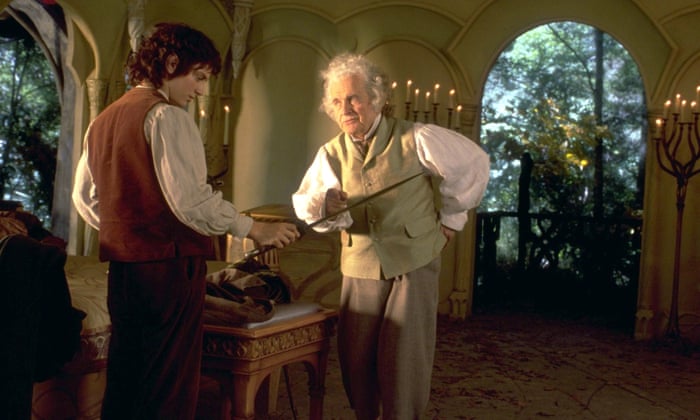 |
| Ian Holm as Bilbo Baggins, with Elijah Wood as Frodo, in The Fellowship of the Ring, 2001 |
Holm’s full versatility revealed itself when in 1965 he played Lenny in the premiere production of Harold Pinter’s The Homecoming at the Aldwych: what Holm gave us, unforgettably, was a savage peacock in Pinter’s glittering north London human zoo, but one rendered impotent by Vivien Merchant’s sexually charged Ruth. After repeating the role in New York in 1967 – where he won a Tony award as best supporting actor – Holm returned to Stratford to play a fiery, intemperate Romeo in Karolos Koun’s highly physicalised Romeo and Juliet. By now, however, Holm was ready for a break from the RSC, and there followed a series of roles in new plays, including Manfred in Wesker’s The Friends at the Roundhouse and Nelson in Rattigan’s A Bequest to the Nation at the Haymarket (both 1970).
Holm’s career prospered, but it was in 1976, when he was scheduled to play Hickey in an RSC revival of The Iceman Cometh at the Aldwych, that he was struck by a paralysing terror: in the course of the final previews he was found curled in a foetal ball in his dressing-room, unable to go on stage. The source of his fear was never fully explained, but it meant that over the next two decades he turned increasingly to film and television, although there was a striking return to the stage in 1979 in Uncle Vanya at Hampstead.
Nonetheless, Holm was soon in constant demand for the screen. His memorable TV appearances included a whimsically capricious JM Barrie in The Lost Boys (1978) and his film work ranged from Alien (1979), in which he was a decapitated android spewing out yellow gunge, to Chariots of Fire (1981), where he was a straw-boatered sports trainer with a faint resemblance to Max Beerbohm. Notable work followed in the comedies Big Night (1996), A Life Less Ordinary (1997) and Beautiful Joe (2000), but it is probably his Bilbo Baggins in The Lord of the Rings that will be his ultimate passport to screen fame.
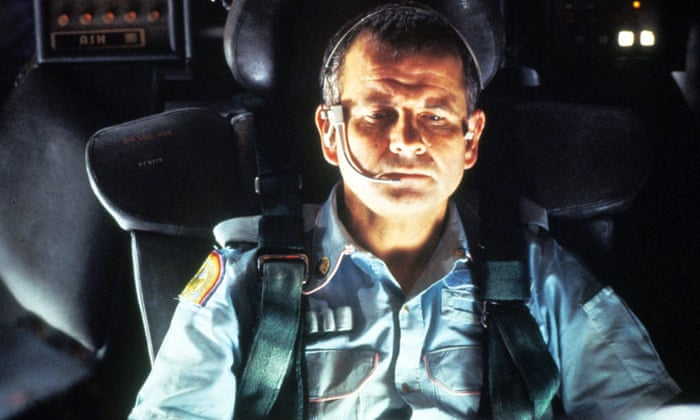 |
| Ian Holm in Alien, 1979. |
The stage, however, was Holm’s natural stamping ground and when he did eventually return, it was in triumph. In 1993 he played Andy, the dying, foul-mouthed, irascible ex-civil-servant, in Pinter’s Moonlight at the Almeida theatre: he invested the role with a scorching fury born out of a sense that, in a world without reason or religion, life is as meaningless as death. He returned to Pinter in 1994 in a production of Landscape first seen at the Gate, Dublin, and then at the National Theatre and on television. Playing opposite his then wife, Penelope Wilton, Holm turned the bluff Duff into a hauntingly tragic figure craving absolution and forgiveness from his walled-off spouse, Beth.
After this performance it seemed only natural he should play King Lear, which he memorably did in Richard Eyre’s 1997 Cottesloe production. Stocky, grizzled and bullet-headed, he captured both Lear’s patriarchal ferocity and descent into helpless suffering.
And when in 2001 he came to play Max in the Dublin Gate theatre’s revival of Pinter’s The Homecoming, also seen in London, there were unmistakable echoes of Lear: under all the bullying bluster there was a terrifying sense of desolation as, at the end, he blundered towards his daughter-in-law emitting a great animal wail. For some of us this was every bit as moving as his Lear.
Born in Goodmayes, Ilford, in what is now the London borough of Redbridge, Ian was the son of Scottish parents, Jean (nee Holm), a nurse, and James Cuthbert, a psychiatrist. James was superintendent of the local mental hospital, where his wife also worked.
From Chigwell grammar school, Holm studied for the stage at the Royal Academy of Dramatic Art (1950-53), with a year’s interruption for national service. Mostly forgoing the grind of weekly rep – apart from a brief stint in Worthing in 1956 – he made his debut in 1954 at Stratford. He was small of stature, but there was a vocal incisiveness and inner mischief about him that made him a natural comedian, and led to his being cast as Puck in Hall’s celebrated Midsummer Night’s Dream and as the Fool to Charles Laughton’s underpowered Lear (both 1959).
Inevitably, one speculates about the roles Holm might have played but never did: Iago, Macbeth, Peer Gynt. But, although his theatrical career was fractured by stage fright, he was a tremendous actor who combined a laser-like vocal precision with a capacity both for baffled rage and spiritual desolation. What is gratifying is that, in his later years, Holm ascended into true greatness and claimed his rightful throne. Made CBE in 1989, he was knighted in 1998.
In 1955 he married Lynn Shaw, and they had two daughters, Jessica and Sarah-Jane. They divorced in 1965, and with the photographer Bee Gilbert, his partner until 1976, he had a son, Barnaby, and a daughter, Lissy. In 1982 he married Sophie Baker, with whom he had a son, Harry. They divorced in 1986, and in 1991 Wilton became his third wife, the marriage ending in divorce in 2002. The following year he married Sophie de Stempel. She and his children, and eight grandchildren, Talulah, Poppy, Tierney, Archie, Karris, Ellie, Edie and Teddy, survive him.
Michael Billington
Ryan Gilbey writes: Versatile screen performances in commercial hits made Ian Holm popular with audiences who had never seen him set foot on stage. In four of the six parts of Peter Jackson’s 18-hour film cycle based on JRR Tolkien’s The Lord of the Rings and The Hobbit, Holm was a mischievous Bilbo Baggins, the homely hobbit whose obsession with a magic ring sets the entire adventure in motion. After The Fellowship of the Ring (2001) and The Return of the King (2003) came the prequels An Unexpected Journey (2012) and The Battle of the Five Armies (2014). By this point, for his final film credits, Holm was playing Old Bilbo to Martin Freeman as his younger self.
On television, he provided teatime entertainment for a generation as Pod, the father in a family of tiny people who live beneath the floorboards, in the BBC’s charming adaptation of Mary Norton’s The Borrowers (1992), and its sequel, The Return of the Borrowers (1993), with Pod’s wife played by Wilton.
Early bit-parts in television and films were confined mostly to period pieces, including Franco Zeffirelli’s TV version of Jesus of Nazareth (1977). His cinema breakthrough came in Alien (1979), in which he was chilling as an android who goes to extreme lengths to protect a bloodthirsty organism. Even decapitation did little to quell Holm’s wry menace.
That film’s success coincided with his retreat from theatre and heralded a run of detailed performances. He was Oscar-nominated for Chariots of Fire and made a highly amusing Napoleon in Terry Gilliam’s fantasy Time Bandits (both 1981). (He played the military leader again, as well as his double, in the 2001 comedy The Emperor’s New Clothes.) He was touching as Desmond Cussen, besotted with Ruth Ellis (Miranda Richardson) – later the last woman to be hanged in Britain – in Dance With a Stranger, and as Lewis Carroll in Dreamchild (both 1985).
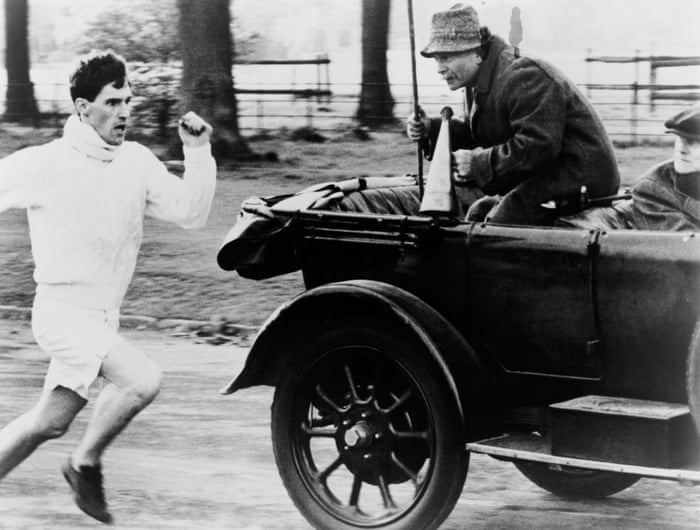 |
| Ian Holm, right, as the coach Sam Mussabini, with Ben Cross as Harold Abrahams, in a scene from Chariots of Fire, 1981. |
He was part of the ensemble cast of Woody Allen’s drama Another Woman (1988) and acted for Kenneth Branagh in Henry V (1989) and Mary Shelley’s Frankenstein (1994), though he was not in Branagh’s Hamlet, having already played Polonius in Zeffirelli’s 1990 version starring Mel Gibson as the Prince. He appeared in David Cronenberg’s daring film of Naked Lunch (1991) and played the radical Dr Willis in The Madness of King George (1994) as well as a crass restaurateur in the culinary comedy Big Night (1996).
Holm got his first film lead, and gave arguably his greatest screen performance, in Atom Egoyan’s The Sweet Hereafter (1997), in which he played a troubled lawyer who tries to persuade bereaved families to sue following a fatal crash involving a school bus.
The director, Atom Egoyan, expressed surprise at being the first film-maker to have given Holm a lead role because, he said, “he is often the most memorable thing about the movies he’s been in”.
The actor reflected in 2002 on what Branagh had once written about him: “[He said] that I was of the ‘anything you can do I can do less of’ school of acting, and I guess I took that as a great compliment. I believe in working from the script. I don’t believe in doing much research, partly out of laziness. I’m a lazy person. I suppose I just assume everything will be all right on opening night.” And, with the exception of The Iceman Cometh, it was.
• Ian Holm (Ian Holm Cuthbert), actor, born 12 September 1931; died 19 June 2020

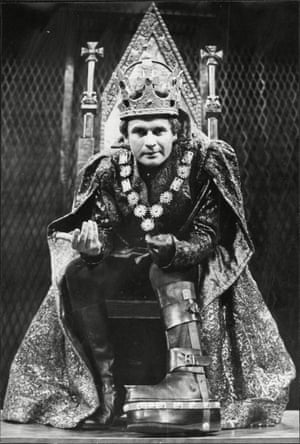

No comments:
Post a Comment